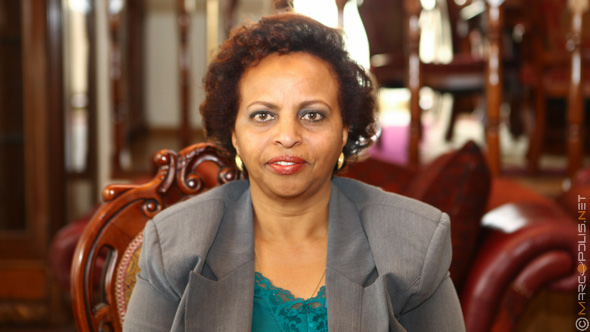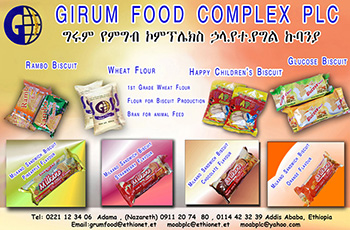Marble industry is a very profitable business in Ethiopia, says MOAB Plc
Abeba Tesfaye, Managing Directress of MOAB Plc, GIRUM Food Complex
MOAB Plc and Girum Food Complex want to diversify their local production and include production of other nutritious foods like supplemental foods for children, lactating mothers and rehab patients, all to substitute for imports. MOAB is also present in the marble industry in Ethiopia. To develop its marble project, the company is looking for international partners with experience and technology required for the marble processing.
Interview with Abeba Tesfaye, Managing Directress of MOAB PLC, GIRUM Food Complex

What is your overview of the business sector and the business climate in Ethiopia and what is your outlook for 2014 and onward?
The business sector in Ethiopia is very promising because we have very good promises at the ground level. People are motivated so in every direction I think it looks very good.
What is the core business of MOAB Private Limited Company?
MOAB Private Limited Company was started in 1994 by me and my husband. By the way, I am a graduate from Addis Ababa University in mathematics. After graduation, I went straight into business and I started this sanitary pad production under the brand Lady Style. At that time, it was the only kind of this product and in addition we do general import and distribution plus trading.
What growth have you experienced on this side of the business in the past couple of years? Is it a growing industry?
Yes, it is a growing industry because after it started in 1994, then in 2005 we started the GIRUM Food Complex – as a result of our efforts with MOAB because we worked very hard and we did well so we started this food complex. The investment capital was around 2.8 million so we did well with that. We expanded into the food complex because we want to stick to local raw materials. In MOAB sometimes we have foreign currency allocation problems so we want to stick to local raw materials with the main material being wheat. That is why we opened the food complex.
We want to diversify by producing nutritious foods like supplemental foods for children, for lactating mothers and for rehab patients. That is in greater demand and will give us more strength if we expand in that direction.
For the food complex, do you still import any raw materials or do you just rely on what you have here in Ethiopia?
We do import some, but the main raw material, which is wheat, we can buy here. We import additives, color, packing materials, etc.
How is that business growing so far, since 2005? What annual growth have you been achieving in this part of the business?
It has not been up to our expectations because there should be mass production to be competitive in the market. We have to produce in mass and we are not doing that right now. You have to work a 24 hour shift to produce in mass and then the price will go down and we will rule the market. We are doing our best but it is not up to our expectations. We want to diversify by producing nutritious foods like supplemental foods for children, for lactating mothers and for rehab patients. That is in greater demand and will give us more strength if we expand in that direction.
Do you have any plans for investments in this sector for the food sector – the annual plan for investment?
Yes, we have done the feasibility study complete and everything we need to expand in this direction and we are looking for partners in technology, finance, skills and different forms. We are looking for assistance.
Have you identified any markets internationally for exports?
Not as such, but if we produce quality products here then we can substitute for imports. That is our goal and how we move forward – not with exports but with import substitution with what we produce.
 Can you talk to us a little bit about the marble company that you just started recently? Give us a little bit of history on that company.
Can you talk to us a little bit about the marble company that you just started recently? Give us a little bit of history on that company.
The marble industry was founded by six of us – me and my husband Mr. Moges Beyene and four other family partners. It has been two years and around 645 km from here in Assosa we have a marble quarry. We bring the rocks from the quarry and then we process it here in Dukem. That is what we are doing. The technology is a little backward and we are not efficient enough but the demand is very, very high. In this case we are looking for partners. It is a very profitable business as well.
What joint ventures do you have with the government in terms of this marble? Do you purchase this marble from the government or what relationship do you have?
No, it used to be privately owned and we bought it.
Is it your plan to develop the local market or are you focusing more on the international export market?
We are planning on local as well as export, especially if we have the latest technology to process the marble. Then for exports, even in its crude form which is a block form, the demand is very high. We can export in the block form or if we have the right technology, a refined, finished product can also be exported. That is what the opportunity is for this product.
The marble business is also a very competitive business. In terms of pricing, do you see yourself competing with other marble-producing countries like Spain, Italy and others?
We are selling marble locally. People will even pay in advance because there are shortages. At the factories, they will pay four or six months in advance to get their marble. However our technology is outdated and so we are not efficient in producing enough for the market.
Yes, we do because first of all, labor is cheap here, and second, is our proximity. Ethiopia is located in a very good place for exporting to any country. Our proximity assists us in exports and helps us to be competitive.
What sort of investment would be needed in this type of project?
We need different kinds of machinery, including the latest technology, and we need financial investment in every direction because the resource is huge there. It is enough to last for the next 60 to 70 years, so as far the raw material, it is there. If we have the latest technology, skills, know-how and finance, then we can do it.
Have you done any sales in the marble business so far?
Yes, we are selling locally. People will even pay in advance because there are shortages. At the factories, they will pay four or six months in advance to get marble. However our technology is outdated and so we are not efficient in producing enough for the market.
Have you identified any marketing strategies to increase your market share in the marble business?
Yes, we are trying but we our hands are tied because our capacity is very low. If the capacity was there, then we would be thinking more about the market share but we are limited by the capacity. If our capacity gets upgraded then we can plan many things.
What are the different types of marble that are available in Ethiopia?
In our case, we have more of a whitish marble but in other locations there is black or even sometimes blue, which is the expensive one. In our case we only have the whitish marble mixed with gray.
You are in a very interesting geographic area. You are not too far from the gulf countries, Saudi Arabia, UAE, or Qatar. Have you done any research as far as marketing your marble to this part of the world?
Yes, we have sent some samples to different places such as Turkey. They are very interested in buying it but as I mentioned, because of capacity limitations, we cannot supply it; however, the demand is there. We participate in different local trade fairs and people are interested in the marble we have. The market is promising.
In terms of shipping this marble, would that be a little bit more difficult to be competitive?
It would be because the technology is backward so we can only prepare it to a limited thickness – 2 or 3 cm thickness. But if they take it, they could even make it 0.5 cm, like for tiles which are 0.5 cm, 1 cm or even less. It means what we are selling for 2 or 3 cm, they can sell it for a fraction of that price. That will not be a problem.
What is your vision for this marble company for the next five to ten years?
I want to see the company growing and expanding and exporting more. We also want to have a good market share in the local market. I can see the future is bright and promising market-wise. As I told you, the investment policies and the regional offices encourage us to do more to work and to expand so everything is good.
Do you have anything else to add?
What I want to add is about the current situation in our country. I’m glad that we are moving in the right direction and we have very good leadership. As I mentioned, everybody is motivated irrespective of age, education, background, religion, gender – everybody wants to work and to grow for change. In the near future I think we will be in a good position. The middle class population is growing. Our former Prime Minister Meles Zenawi planted within everybody the idea that everybody can be a winner and everybody can do what they want. The current youth are very lucky; the future lies in their hands and they can do what they want and so their future is promising.
FAIR USE POLICY
This material (including media content) may not be published, broadcasted, rewritten, or redistributed. However, linking directly to the page (including the source, i.e. Marcopolis.net) is permitted and encouraged.